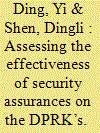| Srl | Item |
| 1 |
ID:
169152


|
|
|
|
|
| Summary/Abstract |
In the Democratic People’s Republic of Korea (DPRK)’s case of nuclear
proliferation, less attention has been paid to the role of security assurances. This
paper seeks to assess the role of security assurances for the DPRK provided by the
UN, the Soviet Union, China, and the United States and to figure out why these
assurances are less effective to bridle its nuclear ambition. It argues that an effective
security assurance for nuclear non-proliferation should meet at least two conditions.
Firstly the security assurance should be credible, which can be realized by being
publicized, legally binding, and infusing with further commitments. Secondly, the
security assurance tailored to the unique features of the target state’s concerns is
more likely to be effective. Using this set of criteria, the only moderately effective
assurance is that provided by the Soviet Union. The general security assurance
of the UN is neither legally binding nor specifically targeted. The alliance with
China exists only on paper as Pyongyang believes Beijing is reluctant to fulfill its
obligation as an ally. The United States is taking a capricious attitude on the DPRK
and none of its security assurances are legalized or address its major concern of
regime survival. These may help explain why security assurances failed to prevent
the DPRK from acquiring nuclear weapons.
|
|
|
|
|
|
|
|
|
|
|
|
|
|
|
|
| 2 |
ID:
163512


|
|
|
|
|
| Summary/Abstract |
In 1994, after a period of substantial fiscal decentralization that has been credited with leading to historically unprecedented growth rates but significant fiscal decline, China introduced a new fiscal system that recentralized the collection of tax revenues. The economic and political consequences of this new Tax Sharing System (TSS) have been debated extensively in the literature, especially because of the renewed interest in fiscal federalism and its interaction with political institutions and economic outcomes. The question central to this debate has been whether the TSS constitutes a significant departure from decentralization with adverse effects on fiscal federalism or whether the recentralization of revenues under the TSS corrects for the overshooting in decentralization with beneficial economic outcomes. This paper exploits the staggered introduction of the TSS across regions and over time for econometric identification purposes and finds robust causal evidence that the TSS had a positive impact on economic outcomes.
|
|
|
|
|
|
|
|
|
|
|
|
|
|
|
|
| 3 |
ID:
121347


|
|
|
|
|
| Publication |
2013.
|
| Summary/Abstract |
Energy saving and environmental protection are important conditions for the sustainable development of Chinese economy. However current widely used generation scheduling model based on predefined production quota and tariff results in heavy energy consumption and severe environment pollution. From 2007, as concerns over energy shortage and environmental pollution, the Chinese authorities introduced the implementation of energy-saving generation dispatching model, which is an important approach to facilitating energy-saving and reduction of pollutant emission. The objective of implementing energy-saving generation dispatching model is to prioritize the use of renewable energy resources and new power plants with high efficiency without compromising power system security and reliability. This paper analyzes the necessity and feasibility of implementing energy-efficient and environmentally friendly generation scheduling models in China. The institutional and technical barriers impeding the implementation of energy-saving generation dispatching model are identified. The development of advanced energy-saving generation scheduling models towards competitive market models and phased planning programs are emphasized in this paper. The effectiveness and experience of provinces piloted energy-saving generation dispatching projects are also discussed.
|
|
|
|
|
|
|
|
|
|
|
|
|
|
|
|